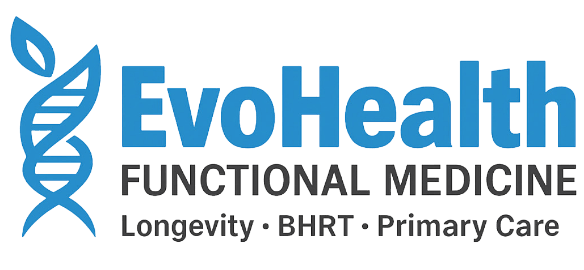Why the Conventional Model Breaks Down
Short visits, restricted testing, and reactive prescriptions are not a failure of physicians — they are a function of billing structure. Insurance can only reimburse for what it defines as “medically necessary,” which leaves enormous blind spots in prevention, early detection, metabolic risk, inflammation, mitochondrial health, nutrition, hormones, and longevity-related decline.
Patients feel this intuitively:
“They never looked deeper,” “I knew something was off,” “I was told everything was fine,” “My labs were ‘normal,’ but I didn’t feel normal.”
This is not a knowledge gap — it is a time and access gap.
Functional + longevity medicine fills that gap by redesigning the care model, not just adding new supplements or tests.

Functional Medicine in Overland Park: A Precision, Systems-Based Approach
Functional medicine asks: Why is the physiology dysregulated?
Conventional medicine asks: Which diagnosis code matches this symptom?
The functional model:
-
Uses advanced diagnostics beyond basic panels
-
Interprets labs at optimal ranges, not disease thresholds
-
Views systems as interdependent (gut → immune → inflammation → neurologic → endocrine)
-
Focuses on mechanistic drivers, not downstream consequences
-
Invests time in pattern recognition, timeline mapping, and metabolic context
This approach is particularly relevant for the most common modern complaints:
-
Fatigue and burnout
-
Brain fog or cognitive slowing
-
Weight resistance despite effort
-
Perimenopausal or andropause symptoms
-
Anxiety rooted in physiology (not psychology alone)
-
Cardiometabolic risk in “normal BMI” patients
-
Subclinical thyroid dysfunction
-
Inflammation not yet visible in standard labs
In a traditional model, most of these are either dismissed, deferred, or medicated.
In a functional-longevity model, they are signals — not noise.

Why Longevity Medicine Is Becoming the Next Standard of Care
Longevity medicine is not anti-aging marketing — it is early disease interception.
It is cardiometabolic prevention before calcification.
It is cognition protection before decline.
It is hormone support before dysregulation becomes chronic.
Modern diagnostics now make it possible to:
-
Detect metabolic changes 5-10 years before disease
-
Identify inflammatory burden before symptoms escalate
-
Personalize nutrition via micronutrient and mitochondrial data
-
Measure cardiovascular risk beyond LDL
-
Adapt hormone replacement based on physiologic context rather than generic population averages
-
Reverse trajectory instead of waiting for a clinical threshold to justify intervention
Conventional medicine cannot operationalize this because its reimbursement model is optimized for intervention at disease, not prevention upstream.
That is why the structure matters.

Why DPC (Direct Primary Care) Must Sit Under Functional Medicine
Most people assume functional medicine is “layered on top” of primary care.
EvoHealth reverses this architecture.
Primary care is redesigned first — unlimited access, longer visits, NP continuity, prevention-forward infrastructure.
Then functional & longevity medicine sits on top of that foundation.
Without DPC, you get episodic functional medicine.
With DPC, you get continuity-based precision care.
DPC is what enables:
-
True relational care
-
Real-time medication and symptom adaptation
-
Follow-through instead of “come back in 6 months”
-
Root-cause resolution instead of repeated band-aids
-
Prevention-driven lab interpretation that insurance would never approve
The model itself is the medicine.
Why Patients in Overland Park Are Switching
The largest growth category in functional medicine is not alternative-minded patients — it is formerly conventional-care patients who are frustrated with dismissal, superficial labs, and rushed interactions. They are not looking for “natural medicine,” they are looking for complete medicine.
Kansas City’s highest-demand demographic is now:
-
High-agency patients
-
Prevention-first patients
-
Professionals optimizing long-term health trajectory
-
Individuals unwilling to wait for decline to become disease
What they are choosing is not just a provider — it is a philosophy of medicine.
What Makes EvoHealth Different From Other Functional Medicine Clinics in Kansas City
Most clinics in this space add supplements or testing while still using a visit-based, episodic care model. EvoHealth rebuilt the architecture:
-
DPC-first structure (real access, continuous care)
-
Functional medicine layered on the foundation (systems biology lens)
-
Longevity methodology (future risk + optimization)
-
Hormonal + metabolic restoration (not just symptom management)
-
Data-driven tracking (objective, not subjective progress)
This creates a closed feedback loop rather than one-off consults.
It is a medical model designed for outcomes, not transactions.

FAQ
Is functional medicine covered by insurance in Kansas?
The testing often is, but the care model is not insurance-billed because insurance does not reimburse for prevention or time-based care. Most patients use HSA/FSA funds.
Is this different from integrative or holistic care?
Yes — this is mechanism-based clinical medicine using advanced diagnostics, not generalized wellness.
How is this different from concierge medicine?
Concierge still operates inside the insurance system; DPC operates outside of it, restoring clinical freedom and depth of care.
Do you replace a primary care doctor?
Yes — EvoHealth functions as the primary care foundation plus advanced functional & longevity care.
Why This Matters for Kansas City Long-Term
The population-level shift toward prevention-only happens when the primary care model changes first. That is what is happening now in Overland Park — a replacement, not a supplement, to the conventional structure.
Root-cause care becomes standard when:
-
providers are not forced into volume
-
labs are not artificially restricted
-
prevention is billable by design
-
time is structurally built into care
Insurance cannot create this.
DPC makes it possible.
Functional + longevity medicine makes it clinically powerful.
The Future of Medicine Will Be Built This Way
Patients are no longer content with:
“Your labs are normal.”
“Follow up if it gets worse.”
“That’s just aging.”
The future is:
What is driving this — and how do we correct it before it becomes disease?
